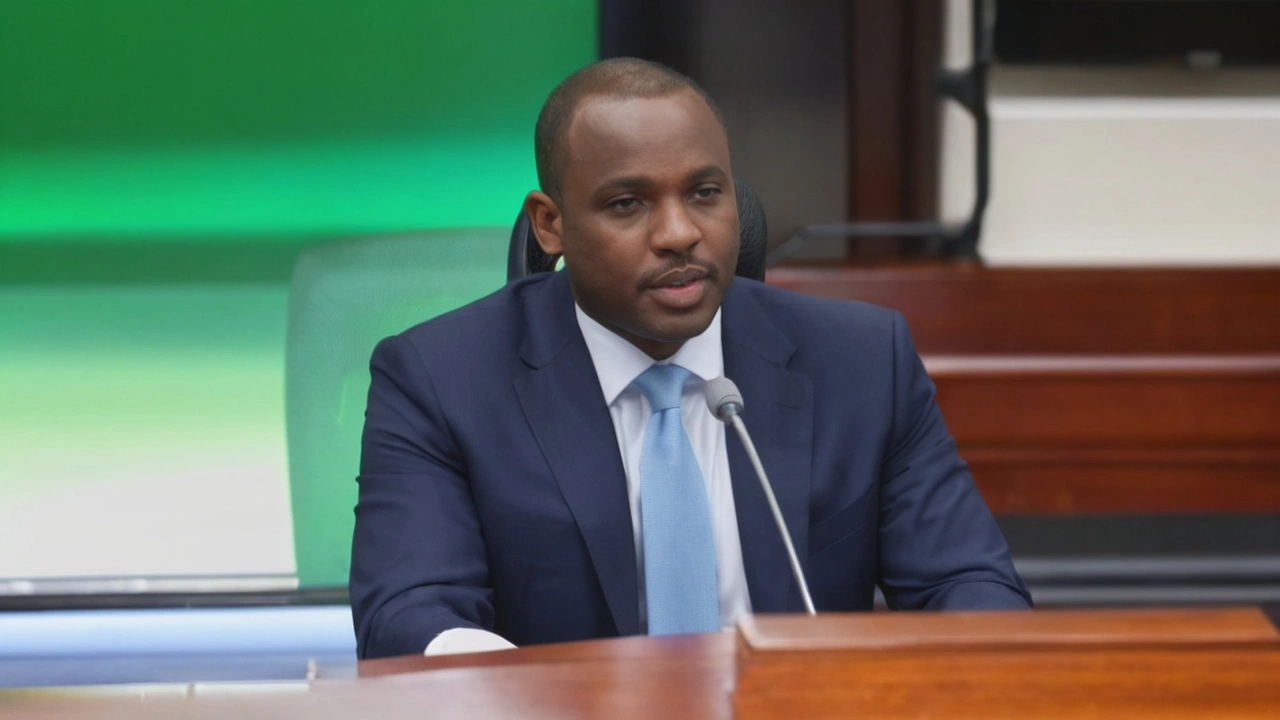Trade Nominee Mvurya Outlines Active Role, Promises Grassroots Engagement
 Aug, 4 2024
Aug, 4 2024
Trade Nominee Mvurya Outlines Active Role, Promises Grassroots Engagement
In a candid and revealing discussion, trade nominee Mvurya has taken a firm stand on what his approach will be in his new role. Far from being a mere 'desk minister,' Mvurya is committed to rolling up his sleeves and engaging directly with the field to drive meaningful changes in the trade sector. His vision aims at harnessing grassroots engagement, ensuring that policies are not just well-crafted but also effectively implemented. This hands-on approach, he believes, is vital for tackling the multifaceted challenges in the trade arena.
For Mvurya, being a trade minister is not about sitting behind a desk. He emphasizes the essential nature of field engagement, talking to business owners, and understanding the hurdles they face daily. This firsthand interaction, he asserts, will enable him to develop and implement policies that are not only relevant but also practical and impactful. Mvurya's approach stems from a belief that the best policies are those shaped by real-world experiences and not just theoretical frameworks.
Grassroots engagement forms the cornerstone of Mvurya's strategy. He is adamant about the need to be on the ground, working closely with various stakeholders, including small and medium enterprises (SMEs), large corporations, and local community leaders. These interactions, he suggests, will provide a clearer picture of the sector's needs and help formulate strategies that drive economic growth and job creation. According to Mvurya, the trade sector's health directly influences the overall economy, making his role critical for national development.
Job creation is a significant aspect of Mvurya's vision. He plans to initiate programs that foster entrepreneurship and support businesses in scaling up, thereby creating more job opportunities. This, he believes, will not only boost the economy but also improve living standards for many. Key to this is ensuring that the business environment is conducive to growth. Simplifying regulatory requirements and providing support systems for startups are some ways he intends to achieve this.
Collaborative Efforts Across Sectors
Mvurya is keen on fostering collaboration with other ministries and sectors to achieve his goals. He acknowledges that trade does not operate in isolation and that a holistic approach is necessary for success. Working closely with the Ministries of Finance, Labor, and Industry, among others, will be crucial in creating an integrated strategy for economic development. By pooling resources and expertise, Mvurya aims to address the challenges and opportunities within the trade sector comprehensively.
Mvurya's previous experiences provide a solid foundation for his new role. With a background that spans several key areas, including public administration and economic development, he is well-equipped to navigate the complexities of the trade sector. His track record of implementing successful projects and his ability to lead diverse teams will be instrumental in his efforts to invigorate trade.
Reflecting on his journey, Mvurya speaks of his commitment to public service and his passion for making a difference. He recalls moments of both challenge and triumph, noting that each experience has shaped his approach and fortified his resolve to pursue positive change. This blend of practical experience and unwavering dedication is what he hopes to bring to his new role as trade minister.
Vision for the Trade Sector
Outlining his vision, Mvurya underscores the importance of creating a robust and dynamic trade sector. Economic growth, he believes, hinges on a vibrant trade environment where businesses thrive, and opportunities abound. This vision includes fostering innovation, supporting new ventures, and ensuring that established businesses continue to grow. By enhancing trade infrastructure and facilitating access to markets, Mvurya aims to position the country as a competitive player on the global stage.
Another key aspect of Mvurya's vision is sustainability. He emphasizes the need for trade practices that are not only profitable but also environmentally sustainable. Encouraging green initiatives and responsible business practices will be part of his agenda, as he seeks to balance economic growth with environmental stewardship. This dual focus, he notes, will ensure long-term prosperity and protect the resources for future generations.
Communication and transparency will play a central role in Mvurya's strategy. He plans to maintain open lines of communication with all stakeholders, ensuring that their voices are heard and their concerns addressed. Transparency in policy-making and implementation will be crucial in building trust and fostering collaboration across the trade sector. This inclusive approach, Mvurya believes, will be instrumental in driving the sector forward.
In conclusion, Mvurya's commitment to being more than a 'desk minister' is grounded in his desire to affect change through active and meaningful engagement. His strategy of grassroots involvement, economic growth, job creation, and inter-ministerial collaboration reflects a comprehensive approach to revitalizing the trade sector. Leveraging his extensive background and experience, Mvurya is poised to make a significant impact, driven by a vision that combines practical action with a long-term perspective.
The trade sector holds immense potential for driving national economic growth, creating employment, and improving the overall business environment. With Mvurya at the helm, there is a renewed sense of optimism and expectation. His proactive approach and clear vision set the stage for a dynamic and prosperous future for trade, promising to benefit not just businesses but the entire nation.